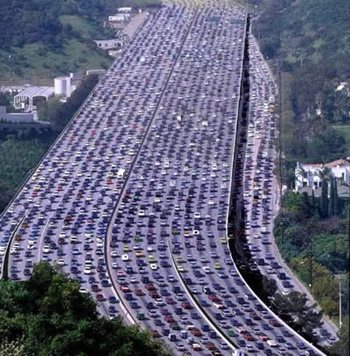We have a major problem on the horizon....
Global gridlock will be here by 2050 if massive changes aren't made. Our world's population is over 7 billion now and we're on track for a population of 9 billion by the year 2044. The cities will become even more dense thus creating traffic problems like we've never seen. China for example, is developing at such a rate that the infrastructure cannot keep up with demand. Just recently I read about a
traffic jam in China that

lasted over 10 days and went on for over 60 miles.
I listened to a speech from Bill Ford, Ford Motor Company CEO which
can be found here. He talks about the impending black cloud of major gridlock and pollution if we keep doing everything like we've been doing. He spoke of his great-grandfather Henry Ford's vision of mobility where vehicles would equal freedom. Now that we've advanced to our current condition, the mobility model we have today will not work tomorrow. Here are the main points from his talk:
- Average American spends 1 week in traffic every year (truckers spend more)
- 800 million cars on the road today around the world
- Expects 2-4 BILLION cars on road by the year 2050
- Average Chinese commute is 5 hours
- In the next 30 years, 75% of the earth's population will live in cities (Currently 54%)
- 50 of those cities will have 10 million or more people
Global gridlock is coming unless we make massive leaps of change in how we look at transportation. Bill Ford rightly acknowledges that unless we take drastic measures, our economic growth will be significantly stifled, our ability to deliver food and health care, particularly to city centers will be seriously degraded. The answer isn't more of the same.
Henry Ford stated that if he asked people what they wanted before he built the Model T, they would've said "faster horses." It is said that Steve Jobs had a similar outlook. The rest of us are short sighted and we're concerned about the next few years, not the next 50. However, there are futurists and technology experts who are working on the big challenges of the next 50 years. It is their mission in life to help contribute to the "giant leap" that will be required soon to avoid imminent global  gridlock.
gridlock.
Some changes are already happening and we'll start seeing similar ideas in the next few years. Companies like Uber are taking away business from taxis. There are "shared car" services that you will soon hear about, further reducing the number of vehicles on the road. Cars and trucks will soon communicate with each other on a larger level. It's already happening with certain aftermarket GPS navigational systems that use data from all of its receivers to accurately determine current and recurring traffic problems.
Smart vehicles will need smart roads and smart parking to communicate with. Smart parking will start to arrive soon because of the huge waste of fuel and time as people try to find parking. In the future, your vehicle will reserve parking before you get to your destination, thus reducing wasted fuel and time.
Every few months a new invention is brought to market that promises to make our lives better. It also brings new problems with it. And the cycle continues... I wonder what Henry Ford would think of us as we sit in traffic and watch a guy walking his dog right past us on the adjacent sidewalk?